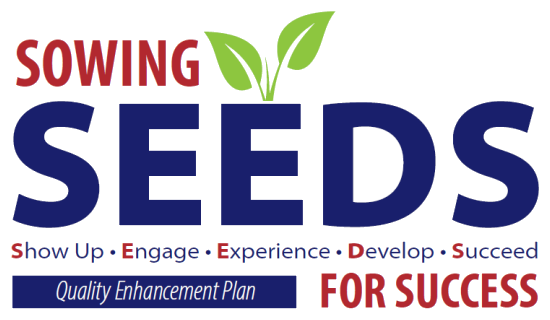What is a QEP?
The Quality Enhancement Plan (QEP) is an integral component of the reaffirmation of accreditation process and is derived from an institution’s ongoing comprehensive planning and evaluation processes. It reflects and affirms a commitment to enhance overall institutional quality and effectiveness by focusing on an issue the institution considers important to improving student learning outcomes and/or student success that is consistent with our mission and strategic plan.
QEP Synopsis:
To equip and prepare students to succeed, Northeast Texas Community College (NTCC) has chosen to implement a one-credit hour First Year Experience course for its Quality Enhancement Plan. Through this project, NTCC will promote student success by utilizing a curriculum that focuses on student engagement and personal responsibility.
The course curriculum will provide students with the basic knowledge within the student engagement and personal responsibility content areas. The expectations are that students will gain foundational knowledge and skills on which they can build as they advance through their academic careers at NTCC and beyond fostering student success. Northeast will use the following learning outline to guide the curriculum.
Learning Outline
Overall Goal: Increase Student Success (ultimately, defined by retention/persistence or its student- defined equivalent).
Sub-Goals and Learning Outcome Topics to Achieve Student Success:
Sub-Goal 1: Increase Student Engagement – To leverage curricular and pedagogical practices to create a culture of student investment where meaningful connections with peers and the community are developed, ultimately leading to student success, retention, and completion.
Learning Outcome Topics built into the curriculum of Sub-Goal 1:
- LO1.1: Students will learn strategies to demonstrate increased personal motivation.
- LO1.2: Students will demonstrate improved engagement with various groups.
- LO1.3: Students will improve overall (oral and written) communication skills during interactions with diverse groups.
Sub-Goal 2: Increase Personal Responsibility – To foster knowledge of self through 1) the development of a "student" identity and 2) understanding of the role that students play within the community of learners.
Learning Outcome Topics built into the curriculum of Sub-Goal 2:
- LO 2.1 Students will demonstrate the ability to employ learning-enhancement strategies.
- LO2.2: Students will learn strategies to build teamwork skills.
To equip students with appropriate tools and strategies, the Sowing SEEDS for Success course will include curricular and co-curricular activities related to personal responsibility, and student engagement increased student success.
The development of the QEP has had significant involvement from institutional stakeholders. Moreover, student success is rooted in institutional planning. Student success and engagement are focus areas of the institution's strategic plan, Destination 2025, which has received broad-based support across the NTCC community. Stakeholders participating in a college- and community-wide survey identified personal responsibility as the area needing the greatest improvement.
Northeast will use a tiered approach to insert the course into the curriculum. The pilot student cohort will consist of first-time, full-time, or transfer students with less than 12 college credit hours pursuing the generalist track. Upon completion of the pilot and initial assessment, the intervention will be expanded to include first-time, full-time students in most other programs across the institution. In addition, an online Sowing SEEDS for Success course will be developed for students who choose distance education courses. All iterations of the first-year experience course will be taught using a similar curriculum tailored to the online environment. To measure student learning and the success of the curricular intervention, NTCC will analyze several variables using different methods. Regarding retention and graduation rates, NTCC will analyze the Developmental Education course sequence, Gateway course completion, and the completion of 15 credit hours for students who do and do not take the Sowing SEEDS for Success course. The goal is that those taking the first-year experience course will persist through the student success measurements at a greater rate than those who do not over time. The student learning in the course will be analyzed using concept- specific rubrics employed pre and post within the class. Additionally, a survey will be administered to both students and instructors to measure the perceived success of the course.

